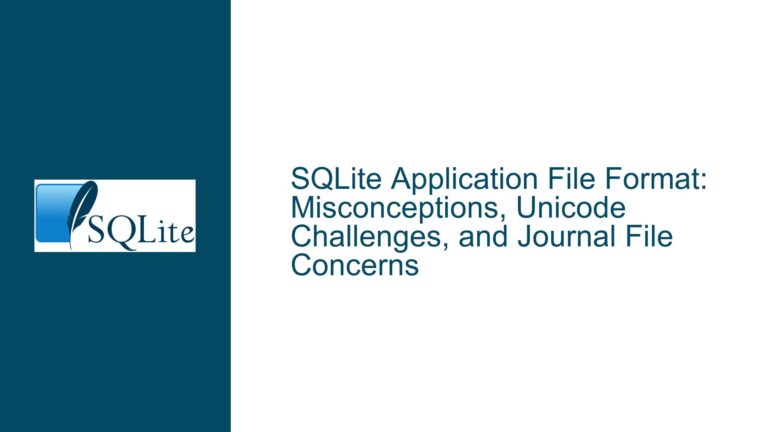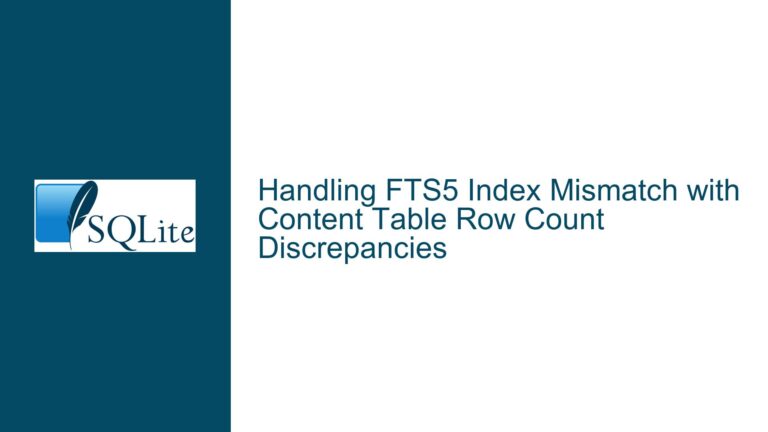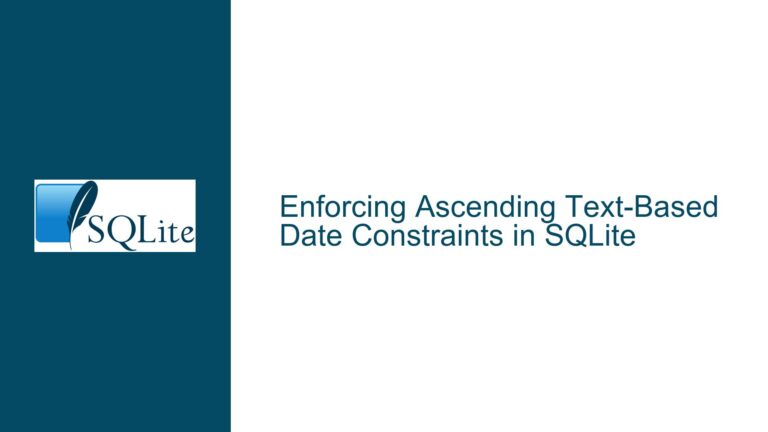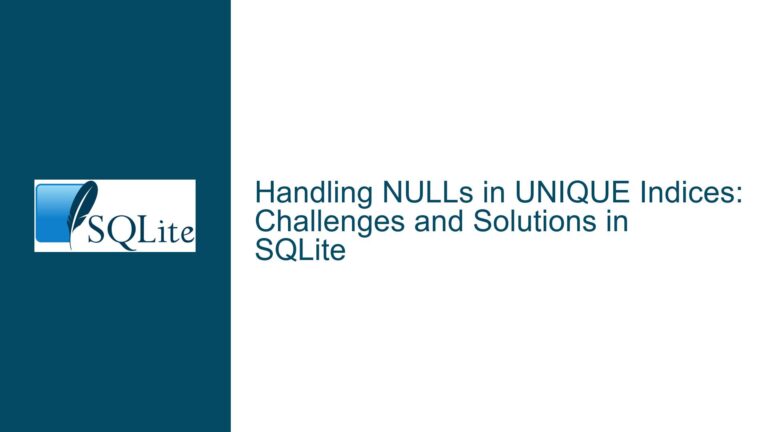ALTER TABLE Rename Column Triggers View ORDER BY Mismatch Error
Schema Dependency Conflicts During Column Rename Operations
When executing an ALTER TABLE RENAME COLUMN command in SQLite 3.35.x environments, developers may encounter the specific error:
Error: near line N: error in view [view_name]: 2nd ORDER BY term does not match any column in the result set
This occurs despite the renamed column residing in a table with no direct relationship to the failing view’s base tables. The core conflict stems from SQLite’s schema modification logic interacting with:
- Recursive Common Table Expressions (CTEs) containing ORDER BY clauses
- Implicit column name resolution in view dependencies
- Column alias handling during automatic view recompilation
The error manifests when renaming any column (even in unrelated tables) forces SQLite to revalidate all database objects, including views that indirectly reference modified schema elements through multi-layered dependencies.
View Validation Mechanics During Schema Changes
Implicit Dependency Chains in View Hierarchies
SQLite maintains an object dependency graph that becomes critical during schema modifications. In the demonstrated scenario:
device table (renamed column)
→ log table (foreign key reference)
→ altlog view (JOINs log+users+act)
→ failure view (CTE based on altlog)
Though the failure view contains no direct device table references, SQLite 3.35.x’s strict schema change validation detects indirect dependencies through:
- Foreign key relationships (log.device → device.id)
- View column provenance tracking
- CTE expression resolution
This creates an unexpected validation path where renaming device.id triggers full recompilation of all dependent views, including those several layers removed.
ORDER BY Clause Positional Validation
SQLite validates ORDER BY clauses against the final result set columns after view/CTE expansion. The error arises when:
- Base column rename alters implicit CTE column naming
- View recompilation loses original column aliases
- ORDER BY references positions rather than explicit aliases
In the original failure view’s CTE:
WITH tmp(name,button,date,time_in,time_out) AS (
SELECT name, button, date, time, null FROM altlog
UNION
SELECT name, button, date, time_in, time
FROM altlog a JOIN tmp b USING(button,name,date)
ORDER BY date,time_in,button
)
The UNION’s second SELECT clause provides:
- time_in (from CTE definition)
- time (from altlog.time)
After renaming device.id → dev_id, SQLite’s view revalidation:
- Rebuilds altlog view with original column names
- Processes CTE column mapping using base (unaliased) names
- Fails to match ORDER BY’s time_in reference to the underlying altlog.time column
Resolution Strategies for Column Rename Conflicts
Explicit Column Aliasing in View Definitions
Modify the failing view’s CTE to use explicit aliases matching ORDER BY terms:
WITH tmp(name, button, date, time_in, time_out) AS (
SELECT
name,
button,
date,
time AS time_in, -- Explicit alias
NULL
FROM altlog
UNION
SELECT
name,
button,
date,
time_in,
time AS time_out -- Alias for clarity
FROM altlog a
JOIN tmp b USING(button, name, date)
ORDER BY date, time_in, button
)
This ensures ORDER BY references:
- date (explicit column)
- time_in (aliased from altlog.time)
- button (explicit column)
Schema Change Isolation Protocol
When modifying tables with complex view dependencies:
- Disable automatic schema validation:
PRAGMA legacy_alter_table = ON; - Perform column rename:
ALTER TABLE device RENAME COLUMN id TO dev_id; - Manually update dependent views:
DROP VIEW failure; -- Recreate view with updated column references CREATE VIEW failure AS ...; - Re-enable schema validation:
PRAGMA legacy_alter_table = OFF;
View Dependency Analysis Tools
Utilize SQLite’s schema introspection to identify implicit dependencies:
SELECT
name AS view_name,
sql
FROM sqlite_schema
WHERE type = 'view'
AND sql LIKE '%device%';
Cross-reference results with:
PRAGMA foreign_key_list('log');
This reveals indirect dependencies through foreign keys and JOIN conditions.
Preventative Design Patterns for Schema Stability
Column Name Versioning Strategy
Implement naming conventions that avoid rename operations:
CREATE TABLE device (
dev_id INTEGER PRIMARY KEY, -- Permanent base name
dev_name TEXT NOT NULL
);
CREATE VIEW altlog AS
SELECT
log.device AS dev_id_ref, -- Explicit reference naming
...
View Isolation Layers
Create intermediate views that abstract column names:
CREATE VIEW device_public AS
SELECT
id AS dev_id,
name AS dev_name
FROM device;
CREATE VIEW altlog AS
SELECT
log.device AS dev_id_ref,
...
FROM log
JOIN device_public ON log.device = device_public.dev_id;
Schema Migration Testing Protocol
- Generate test databases with
sqlite3 :memory: - Execute schema changes in transaction isolation:
BEGIN; PRAGMA legacy_alter_table = ON; -- Perform ALTER operations PRAGMA legacy_alter_table = OFF; COMMIT; - Validate view integrity:
PRAGMA quick_check; SELECT * FROM failure LIMIT 1;
This comprehensive approach addresses both immediate resolution and long-term prevention of schema change conflicts in SQLite environments with complex view dependencies.






